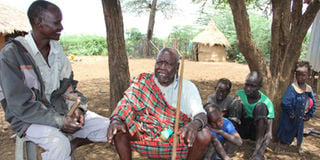Family that lives on an island of peace in a sea of cattle raids

PHOTO | JARED NYATAYA Mzee Lempakany Lotowar, 92, his son Moses Lempakany (left) and other members of his family, at one of his son’s home in Loongeiwuan Village in Baringo County. The old man lives at Baramolok Island on Lake Baringo, with his entire family.
What you need to know:
- Lempakany has lived to see four generations occupy the 93-acre piece of land after inheriting it from his father who inherited it from his grandfather
Though Mzee Lotowar Lempakany lives thousands of miles away from billionaire Richard Branson, he shares a common denominator with the business guru.
Branson owns a 74-acre island in the Caribbean; Mzee Lempakany owns a 93-acre island in Lake Baringo.
From a distance, he looks frail as he sits seemingly pensively on a traditional stool. Mzee Lempakany sniffs tobacco from a container suspended with a string around his neck.
It is not until one is at close range that they realise the energy manifested by the tone of his voice.
At 92, Lempakany has rubbed shoulders with the humble and the mighty, blacks and the whites who are attracted to his island.
Baramolok Island is referred to as the island of love by the local residents. Mzee Lempakany has been staying there with his five wives, 30 children, more than 50 grandchildren and at least 60 great grandchildren.
Mzee Lempakany has lived to see four generations occupy the island after inheriting it from his late father to become the current occupant. Mr Lempakany’s father also inherited the island from his grandfather.
One of his grandsons, Simon Lesita, says that the family survives on fish and livestock both as food and for sale. They use the money that they get from sale of fish and livestock to buy some household goods as well as meet other financial obligations.
Baringo County is synonymous with cattle rustling, but the family of Mr Lempakany is shielded from the cattle thieves.
“Island life has been affordable and safe for us, unlike other parts of the county where bandits have been terrorising people. We have not had an encounter with raiders owing to the difficulty raiders would face transporting the livestock over water,” Lesita, a father of three, says.
Mzee is conservative, but realised the importance of taking his children to school.
“Personally I did not go to school, having come from a community that had little exposure to the modern world,” says Mzee Lempakany who comes from the minority Ilchamus community.
Mr Lempakany’s children studied at Kokwo Primary School in the nearby Kokwo Island, and used to attend school using the rafter-traditional boat. But his grandchildren enjoy the presence of modern motorboats, which they use to commute daily between the two islands.
According to the senior warden in charge of Lake Bogoria National Reserve William Kimosop, island life is treasured in many countries as it is serene.
“This stands out as a unique island in the country; it is very hard to find a single person or a family that owns an island for a long period of time,” says Mr Kimosop, who noted that all efforts should be made to ensure nobody invades the island that belongs to the old man.
Local boat operator Ramadhan Bashir said the island has boosted his business as many tourists, both local and international seek their services to travel to the island to meet Mzee Lotowar.
“The county government should assist the old man build corteges on the island where people can relax. This will not only boost the tourism sector, but also promote our business as boat operators,” Mr Bashir told the Nation.
During the interview, the old man welcomed any effort that is geared towards tapping the tourism resource.
“People have been telling me of that idea for many years and I concur that that is a great idea. I have left it for my children, now that I empowered most of them with education,” he said.
He recalls that during his childhood the land where Lake Baringo stands today was bare, but turned into a big mass of water.
His diet, he says, is made up of natural food without any additives, which he says is to blame for the short lifespan among today’s generation.
He also takes fresh blood “to boost my immunity”. He draws the blood from his many cows that he regards as a source of wealth.
During the interview, one of his sons, who is seemingly following on the footsteps of his father given the fact that he has three wives, helps with the translation.
The old man accuses today’s youth of not heeding the advice of the elders. He says the youth view them (elders) as primitive people, whose advice has been overtaken by the changing times.
“I have always valued polygamy. If I marry one wife, how sure would I be that she would survive? I should get as many as possible to increase their chances of survival,” he noted.
The name “Baramolok” is derived from the word “Olmolok” from the Ilchamus dialect, a sub-tribe of the Maasai and Samburu communities and means an aquatic insect.




